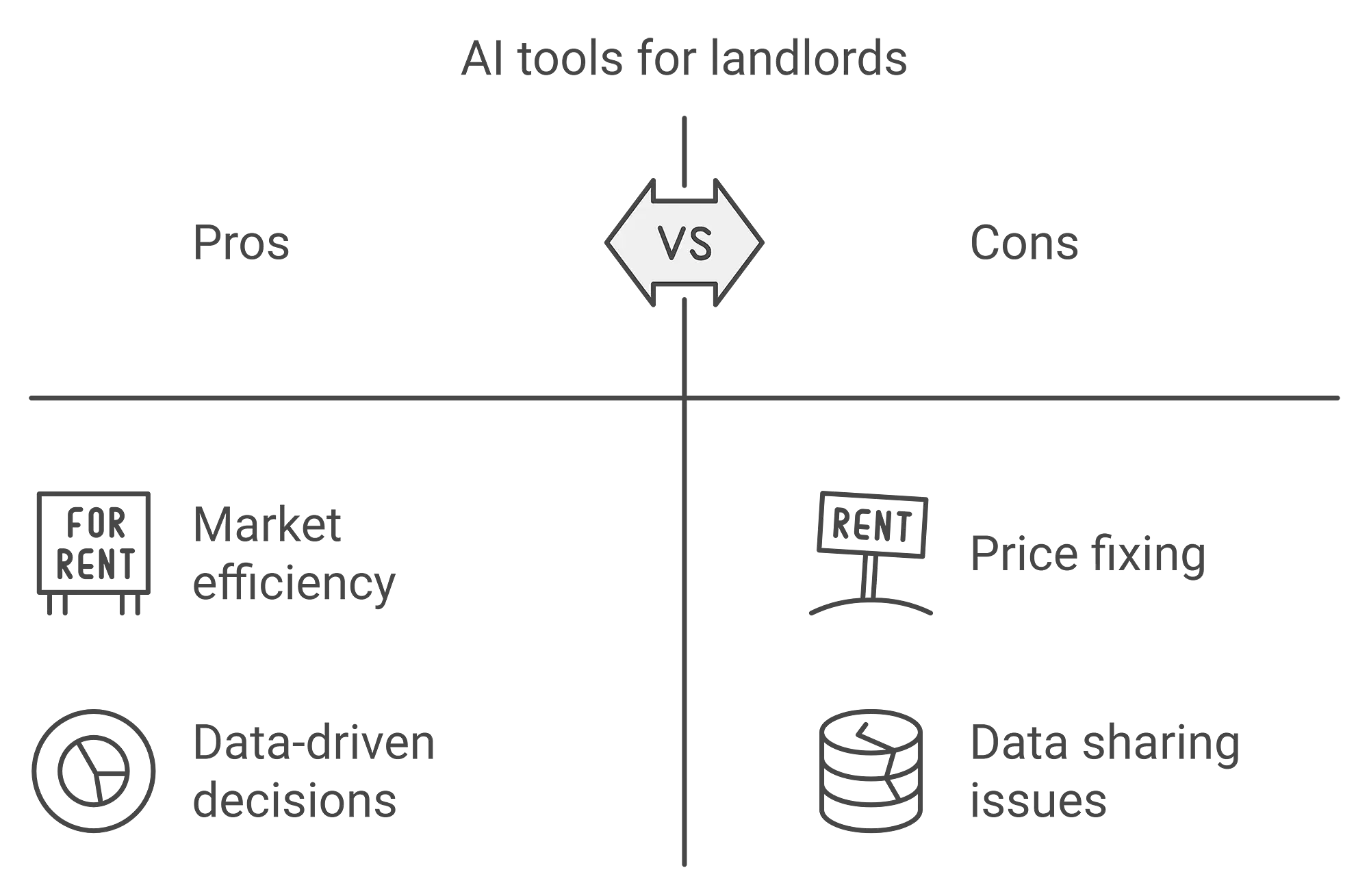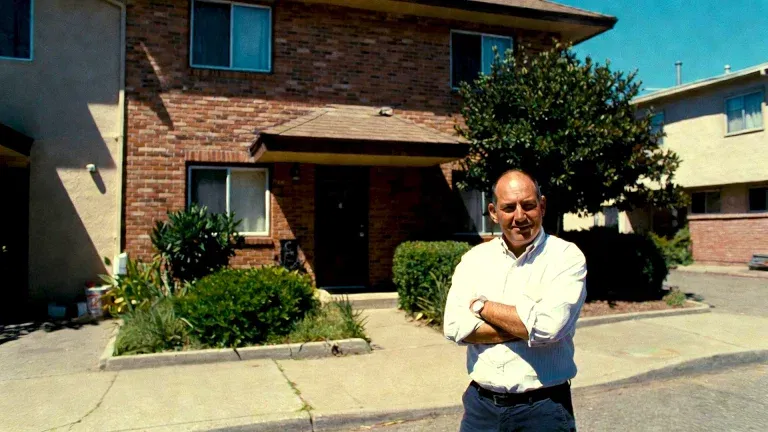If you’re managing your rental in Oakland, San Leandro, Hayward, or anywhere else in the San Francisco East Bay, you’ve probably got your hands full. Between fixing leaky faucets, screening tenants, and trying to keep up with the ever-changing rental laws, who’s got time to worry about what’s happening across the bay in San Francisco, right?
Well, San Francisco’s latest move might just change the game for all of us in the Bay Area rental market. They’ve done gone and banned AI-powered rent calculation tools, and it’s got everyone from tech giants to mom-and-pop landlords talking. So, let’s break this down, suppa East Bay style, and figure out what it means for you and your rental property.
What’s the Deal with This AI Rent Ban?

Picture this: You’re trying to figure out how much to charge for your rental. You hop online, punch in some numbers into a fancy algorithm, and voila! Out pops the “perfect” rent price. Sounds convenient, doesn’t it? Well, San Francisco just said, “Yeah, not so fast Neo …”
The San Francisco Board of Supervisors unanimously voted to ban the use of AI tools for setting rental prices. They’re targeting software from companies like RealPage and Yardi, which have become popular among larger property management firms and corporate landlords.
Now, you might be thinking, “I’m just managing my own place in Oakland. What’s this got to do with me?” Fair question, and we’re about to dive into why this matters for every landlord in the East Bay.
Why Did San Francisco Drop the Hammer on AI Rent Tools?
San Francisco’s beef with these AI tools boils down to a few key issues:
- Price Fixing Concerns: There’s worry that these tools are enabling a kind of high-tech collusion among landlords. Imagine if every landlord in your neighborhood was getting their pricing advice from a community crystal ball. Not exactly a free market, is it?
- Data Sharing Unease: These AI systems often use non-public data shared by participating landlords. It’s like if you and all your landlord buddies were constantly sharing your pricing secrets, but through a computer instead of over beers. Johnny Law frowns on anything that looks or smells like collusion.
- Rent Hikes and Reduced Supply: Critics argue these tools have contributed to higher rents and artificially low vacancy rates. In other words, they’re dragging AI for making the Bay Area’s already tough rental market even tougher.
- Lack of Transparency: When an AI sets the rent, it’s not always clear how that decision was made. And in a market as sensitive as housing, transparency is key.
- Potential for Discrimination: While AI doesn’t have biases in the same way humans do, it can perpetuate existing biases if they’re present in the data it’s trained on. This could lead to unfair pricing practices that disproportionately affect certain groups.
“But I Don’t Use AI to Set My Rents!” -or- Why You Should Still Care
Okay, so maybe you’re setting your rents the old-fashioned way – a mix of gut feeling, a quick look at Craigslist, and maybe a chin wag with your neighbor who’s also a landlord. So why should this San Francisco ban matter to you?
- The Domino Effect: What starts in San Francisco often spreads. Remember when SF started regulating Airbnb? It wasn’t long before other cities followed suit. Oakland, San Leandro, Hayward and other East Bay cities might not be far behind in considering similar bans.
- Market Impact: Even if you’re not using these tools, many large property managers in the East Bay are. If they have to change their pricing strategies, it could affect the overall market, including your little slice of it.
- Legal Scrutiny: This ban is part of a larger trend of increased scrutiny on rental pricing practices. As a DIY landlord, staying ahead of these trends can help you avoid legal headaches down the road.
- Consumer Expectations: As news of this ban spreads, tenants may become more curious about how their rent is determined. Being prepared to explain your pricing strategy clearly and fairly can set you apart in the market.
What Does This Mean for Your East Bay Rental?

Now, let’s get down to brass tacks. How might this affect you and your rental property in the East Bay?
- Changing Pricing Strategies: If you’ve been relying on online tools or apps to help set your rent, it might be time to reassess. Look for methods that don’t use non-public data or AI algorithms to suggest prices.
- Market Knowledge is Gold: This ban emphasizes the importance of good old-fashioned local market knowledge. Your understanding of your neighborhood, property, and local trends is more valuable than ever.
- Demands for more Transparency: You may have to be more open about how you set your rents. Tenants appreciate landlords who can clearly explain their pricing decisions.
- Increased Documentation Requirements: You may be required to keep clear records of how you determine your rental prices. If similar regulations come to the East Bay, you may need to show you’re not relying on any banned tools or practices.
- Rental Market Dynamics: The AI ban could potentially lead to more unstable pricing in the market. Without AI tools suggesting similar prices to many landlords, you might see a wider range of rents for comparable properties. This could create both challenges and opportunities for setting competitive rates.
The DIY Landlord’s Guide to Fair Rent Setting

So, how can you set fair, competitive rents without relying on AI tools? Here are some tried-and-true methods:
- Do Your Homework: Regularly check listings for similar properties in your area. Sites like Zillow, Trulia, and good old Craigslist can be goldmines of information.
- Network with Other Landlords: Join local landlord associations or online forums. Sharing experiences (without coordinating prices, of course) can provide valuable insights.
- Know Your Costs: Factor in your mortgage, property taxes, insurance, and anticipated maintenance costs. Don’t forget to include a reasonable return on your investment.
- Stay Up-to-Date on Local Regulations: Rent control, just cause eviction ordinances, and other local laws can affect your pricing strategy.
- Be Flexible: Sometimes, having a great, reliable tenant is worth more than squeezing out the highest possible rent. Consider the big picture when setting your prices.
- Use Public Data: While AI tools using private data are out, there’s still plenty of public data available. Look into local government reports on housing trends, census data, and publicly available market reports.
- Evaluate Amenities Objectively: Make a detailed list of your property’s amenities and compare them objectively with similar rentals. This can help you price more accurately without relying on dodgy AI suggestions.
- Get Professional Appraisals: Periodically, it might be worth getting a professional appraisal of your property. This can give you a solid baseline for setting rents and making investment decisions.
The Silver Lining for East Bay DIY Landlords
Believe it or not, this ban on AI rent setting tools might have a silver lining for independent landlords like you. Here’s why an AI ban might be a good thing:
- Levels the Playing Field: Without AI tools, big corporate landlords lose out on one of their chief advantages – big data. In this scenario, your local knowledge and personal touch become even more valuable. Use it.
- Simplified Decision Making: Sometimes, less tech means less complication. Trust your knowledge and instincts – they’re often your best tools.
- Opportunity for Innovation: This change opens up opportunities for creative, ethical approaches to pricing. You could develop a reputation for fair, transparent pricing that sets you apart in the market.
- Potential for Higher Quality Tenants: Tenants who appreciate fair, clearly explained rental prices might be more likely to be responsible, long-term renters.
- Increased Property Value: If you can demonstrate a history of stable, fairly priced rentals, it could potentially increase your property’s value to future buyers or investors.
Navigating Potential Challenges
While there are certainly upsides to this shift away from AI-driven pricing, it’s important to be prepared for potential challenges too:
- Time Investment: Without AI tools, you might need to spend more time researching and setting prices. Budget this time into your property management routine.
- Market Volatility: As the market adjusts to these new rules, you might see more price fluctuations. Stay alert and be prepared to adjust your strategy as needed.
- Pressure from Tenants: Some tenants might use this ban as leverage to negotiate lower rents. Beat this underhanded tactic with clear, fair reasoning for your pricing decisions.
- Data Management: You’ll need to be more diligent about collecting and analyzing your own rental data. Consider setting up a simple system to track your property’s performance over time.
Looking Ahead: Navigating the Changing Rental Landscape
The rental market in Oakland and the Eastbay is always evolving, and this AI ban is just the latest twist in the tale. As a DIY landlord in the East Bay, staying informed and adaptable is key to your success. Here are some final tips to help you navigate these changes:
- Keep Learning: Attend local landlord workshops, read up on market trends, and maybe even consider some property management courses.
- Embrace Technology Wisely: While AI rent setting tools might be out, there are plenty of other tech solutions that can make your life easier – from online rent collection to maintenance request apps.
- Consider Professional Help When Needed: While you’re rocking the DIY landlord life, remember that there are times when professional advice can be invaluable, especially with complex legal or regulatory issues.
- Focus on Value: Instead of obsessing over squeezing every last dollar from your property, focus on providing value to your tenants. A well-maintained property with reasonable rent often leads to long-term, hassle-free tenancies.
- Develop a Pricing Strategy: Create a systematic approach to setting and reviewing rents. This could involve regular market checks, annual property assessments, and clear criteria for rent increases.
- Communicate Clearly: Be prepared to explain your pricing decisions to tenants. Clear communication can prevent misunderstandings and build trust.
- Stay Legally Compliant: As regulations evolve, make sure you’re always on the right side of the law. Consider periodic check-ins with a trusted real estate attorney to review your practices.
- Think Long-Term: Remember that successful property management is a marathon, not a sprint. Sometimes, a slightly lower rent for a great tenant can pay off in reduced turnover and maintenance costs.
- Be Part of the Solution: Engage with local housing discussions and policy-making processes. Your perspective as an independent landlord is valuable in shaping fair, effective housing policies.
Wrapping Up: Your East Bay Rental’s Future is in Your Hands

As an independent landlord in the East Bay, you’re in a unique position to adapt to these changes. Your personal touch, understanding of your property and neighborhood, and ability to build real relationships with your tenants are your superpowers. No AI can replace that.
Remember – you’ve got this. Stay informed, trust your instincts, and keep focusing on what’s best for both you and your tenants. That’s the real formula for success in the East Bay rental market, no fancy-schmancy algorithms or AI overlords required.
And hey, if all this has you thinking that maybe, just maybe, you could use a hand with your property management, we at SLPM Property Management are always here to chat. We bring that same personal touch and local expertise to every property we manage, combining the best of both worlds – professional management with a human face.
Whether you’re looking for advice, considering professional management, or just want to stay in the loop about East Bay rental trends, don’t hesitate to reach out. Let’s navigate these changes together, one rent calculation at a time.
Remember, it’s not about having the fanciest AI – it’s about being a fair, knowledgeable, and responsive property owner. And that’s something no algorithm can beat.




